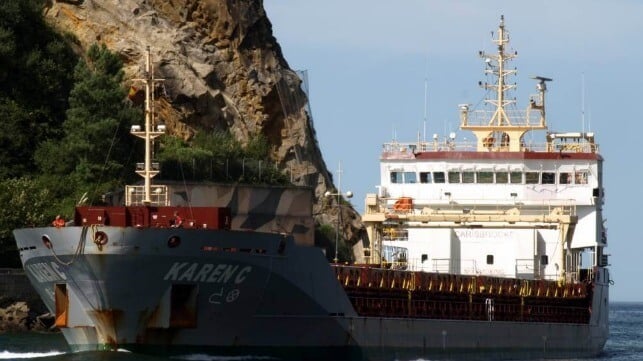
Hydrogen Combustion Auxiliary Engine to be Tested in 2025 on UK Cargo Ship
Published by Todd Bush on November 21, 2024
An innovative project designed to validate hydrogen combustion engines for ocean-going vessels and lay the foundation to scale up the technology is set to proceed in March 2025 aboard a cargo ship operated by Carisbrooke Shipping. The partnership, led by Carnot Engines and funded as part of the UK government’s initiatives in decarbonization, has secured a source for hydrogen from biomass to power the 40-day sea trials.

Hydrogen combustion auxiliary engine will be tested on a UK cargo ship (Carisbrooke Shipping)
>> In Other News: Hypilot Official Opening
Waste-to-Hydrogen Supplier Joins Effort
Compact Syngas Solutions has joined the effort and will supply 200 kg of hydrogen for the trials. Based in Wales, the company has developed an advanced gasification process that generates electricity, heat, and hydrogen gas from waste products. It employs materials including waste wood and other selected non-recyclable resources in its process. Compact Syngas Solutions was the recipient of a UK grant for £4 million to develop its biomass and waste-to-hydrogen plants, including the addition of carbon capture to its hydrogen production.
“Sourcing hydrogen for our trial has proven harder than we expected, and we’re massively grateful to Compact Syngas Solutions for helping out,” said Jeremy Howard-Knight, head of business development at Carnot. “It’s incredible to think that these huge ocean-going vessels are being powered by waste wood that could have ended its days by rotting on a tip.”
Securing Support and Funding
Carnot was awarded £2.3 million in February 2023 to deploy a 50kW hydrogen auxiliary engine demonstrator, working with Carisbrooke Shipping, Brunel University, and the Manufacturing Technology Centre, while involving Bureau Veritas and the UK’s Maritime and Coastguard Agency for regulatory compliance.
The project is based on the assertion that smaller vessels running shorter ranges could consider electrification or fuel cells, but for long-distance ocean-going cargo vessels, this would not be viable. They assert that the cost, weight, and practicalities become prohibitive, but their concept for a hydrogen combustion engine would be a compelling solution.
Technical Advances in Engine Design
Carnot reports that by pioneering the use of technical ceramics in combustion engines, it has eliminated major limiting factors to engine efficiency. It claims its engines have a break thermal efficiency of 70 percent, nearly double what is achieved by modern state-of-the-art engines. Carnot said the engines will massively reduce fuel consumption and costs. It highlights that above a certain air-to-fuel ratio, hydrogen combustion emits zero emissions with negligible levels of CO2, NOx, and PM.
Preparing for Sea Trials
The demonstration calls for testing the engine at Brunel University before placement aboard one of Carisbrooke Shipping’s K-class cargo ships. Built in 2010 in China, the vessels are 6,800 dwt, have a length of 106 meters (348 feet), and operate at speeds of up to 11 knots with a MAK main engine and a Sandfirden diesel auxiliary engine.
The trial will run for 40 days in the Irish Sea starting in March 2025. The vessel will operate between Bristol and Belfast. Carnot says the 50kW engine will be a precursor to 200 to 400kW auxiliary engines, with plans to eventually produce a 1 to 10MW main engine based on this technology.
About Carnot Engines
Carnot Engines specializes in developing high-efficiency hydrogen combustion engines for maritime and industrial applications, utilizing advanced materials to reduce emissions and improve performance.
Subscribe to the newsletter
Daily decarbonization data and news delivered to your inbox
Follow the money flow of climate, technology, and energy investments to uncover new opportunities and jobs.
Latest issues
-
How Duke Energy Just Made Hydrogen History
Inside This Issue 💧 Duke Energy Florida Unveils Nation's First System Capable Of Producing, Storing And Combusting 100% Green Hydrogen ✈️ Technip Energies’ Hummingbird Technology Powers LanzaJet’s...
-
The $9B Deal That Almost Didn't Happen
Inside This Issue 💰 The $9B Deal That Almost Didn't Happen ⚖️ IMO Rules Understate Benefits of Utilising Captured Carbon, Says GCMD 🌾 Corteva and bp Launch Biofuel Feedstock Joint Venture Etlas 🔬 ...
-
Nebraska's 3-Plant Ethanol CCS Gamble Pays Off Big
Inside This Issue 🌽 Nebraska's 3-Plant Ethanol CCS Gamble Pays Off Big 🧊 New Evaporative Crystallizer Design Accelerates Direct-Air Carbon Capture ✈️ From SAF to Solar: DHL’s Bold Steps Toward Net...
Company Announcements
-
Capstone Green Energy Holdings, Inc. (the "Company” or “Capstone”) (OTCQX: CGEH), together with its subsidiaries, a leading provider of clean technology solutions using ultra-low emission microturb...
-
Duke Energy Florida, a subsidiary of Duke Energy, unveiled its DeBary Hydrogen Production Storage System in Volusia County, marking the first demonstration project in the United States capable of u...
-
ESG Clean Energy, LLC ("ESG"), developers of Net Zero Carbon Footprints and clean energy solutions for distributed power generation, announced today it has signed a licensing deal with Viking Energ...
-
LanzaTech Achieves Guaranteed Performance At Japan MSW-To-Ethanol Plant
Collaborative pilot at Kuji facility showcases robust ethanol yields using LanzaTech’s fermentation technology Achieved ethanol yields exceeding guaranteed performance for over 14 consecutive d...